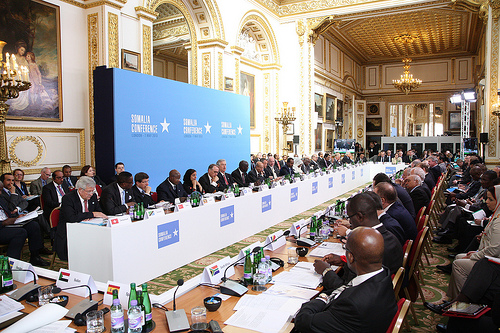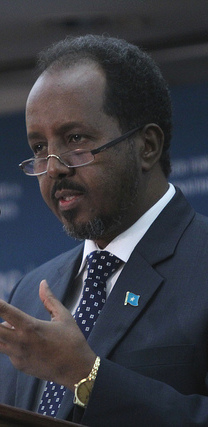Jonathan Fisher is a lecturer in international development, researching the relationship between Western aid donors and developing states. He is particularly interested in how donors ‘construct’ perceptions of foreign governments and key concepts (eg ‘fragile state’) in international development. He is also interested in the extent to which these ‘knowledge construction’ processes are influenced by external actors and bureaucratic structures as well as by policy-makers themselves. Jonathan co-convenes postgraduate modules on Aid Management and on Critical Approaches to Development for both on-campus and distance learning students.
And so it ends. After months of preparation, fretting over guest lists, measuring flags and re-drafting seating arrangements, the Somalia Conference is over. The final communiqué has been issued, the speeches uploaded to YouTube and the attendees prepped for the next leg of the reconstruction roadshow. Representatives of Somalia’s new administration can look forward to high-level discussions in Tokyo, Nairobi, Brussels and Istanbul – not to mention in New York and Addis Ababa – over the coming months where plans to rebuild the devastated former state will be fleshed-out in consultation with regional and international partners. What can be said, then, of last week’s event in London? A milestone on the path to Somalia’s rebirth or a day of prepared statements and hotel rooms? A conference that will set in motion a renewed commitment to re-assembling a shattered country or, like last year’s London Somalia Conference, one that will be remembered as little more than yet another inconsequential Somalia summit?
The answers to these questions will, naturally, come with time and cannot be found in the measured but vague statements released from the conference over the course of last Tuesday’s deliberations. Needless to say, though, that any successes in Somalia will come from a combination of two things: the level of commitment by Hassan Sheikh Mohamud’s weak government (in power since last autumn) to win the ‘hearts and minds’ of Somalis outside militarized Mogadishu and the extent to which international actors (including regional African states) are willing to support it in its effort to do so. The evolving role of Somalia’s neighbours – particularly of Ethiopia, Kenya and Uganda – as the country gets back on its feet is, in fact, one of the major debates that is yet to be had out in the open. It remains, however, one of the two elephants in the room when it comes to finding global ‘Somalia solutions’ (as Private Eye might have it) – the other being the looming presence of Istanbul and its unilateralist approach to Somali diplomacy.
For the Hassan Sheikh administration owes even its tenuous hold over Mogadishu almost entirely to its African brethren; Ugandan troops make up the bulk of the AU peacekeeping force, AMISOM, which has pushed Islamist militant group Al-Shaaab out of the Somali capital and restored a level of order there since its inception in 2007. Likewise, the battle to extend the government’s writ throughout the rest of the country, much of it still under Al-Shabaab control outside major cities, is being waged not by government forces – such as they are – but by the Ethiopian and Kenyan militaries which intervened in Somalia in 2006 and 2011 respectively. The rebuilding of Somalia hangs very much, therefore, on the establishment of a strong, disciplined and broad-based security apparatus which Somalis view as legitimate and which AMISOM and Ethiopian forces can hand over to in the months and years to come.
The Somali government’s plan for developing this apparatus was shared with its regional partners at the Somalia Conference and it remains to be seen how they respond to it both operationally and politically. My own discussions with African officials and observers in Addis Ababa and Kampala during the last month, however, lead me to conclude that the path to a handover will not be as harmonious as Tuesday’s Communique suggests. For while Kenya, Ethiopia and Uganda remain divided on some key questions (for example, whether Somalia should adopt a federal or unitary political system) they remain fairly united on others. The question of the new Somali government’s ability to deliver such a robust and inclusive security sector is in the latter category – and one which all three administrations would privately answer in the negative. The problem for them, though, is not so much Mogadishu’s perceived incompetencies but rather its reluctance to take advice from its regional patrons.
Hassan Sheikh Mahamud, President of the Federal Republic of Somalia. Photo credit: Center for Strategic & International Studies
Unlike his predecessors, who presided over a ‘transitional government’ between 2004-2012, Hassan Sheikh became the first ‘permanent’ president of Somalia for nearly two decades last year and has already overseen the re-establishing of diplomatic ties with the US and the International Financial Institutions. Emboldened by these trappings of sovereignty, the Somali leader has adopted a much less subservient persona in his dealings with regional counterparts, increasingly insisting on his door – rather than that of the Ugandan president or Ethiopian prime minister – being the ‘one door to knock on’ for those interested in reconstructing Somalia.
This posturing has rankled with the occupants of regional presidential mansions who have been used, since the mid-2000s, to getting their way in Mogadishu – in 2011, for example, Uganda forced out Somalia’s prime minister as part of a ‘Kampala Accord’ and secured the extension of former president Sharif Ahmed’s mandate by a year. Viewing the Somali administration as inexperienced, naïve and inward-looking, regional powers are loath to allow it full rein over coordinating international efforts in the country. They are less clear, however, over which body should carry out this responsibility: when I asked one senior official from a nearby African state recently ‘if not the Somali government, then who?’ I was told, after some hesitation, that it should be ‘the AU….or [regional body] IGAD…probably’.
Africa and aid-watchers will immediately recognize from this dynamic a familiar debate on the issue of ‘ownership’ – a ubiquitous but slippery term in the development world since the late 1990s. Indeed, how to foster and secure ‘Somali ownership’ was a key theme in many speeches made in London last week. While the debate may be familiar, though, the context most certainly is not. For in the case of Somalia, it is not simply ‘Western’ donors negotiating ownership with African aid recipients but Africans negotiating it with other Africans. Kenya, Ethiopia, Uganda and other forces in today’s Somalia have, in part, taken on the role of donors in the last few years – even if much of their funding (at least with AMISOM members) still comes from Europe and North American governments.
For this author, then, three key questions emerge from the Somalia Conference. One: Will African governments succeed in fostering ‘recipient ownership’ of development where Western donors have largely failed? Two: Do they actually want to? And three: To what extent is this a portent of things to come? Though it has its detractors, the African intervention in Somalia represents – thus far – one of the most successful international peacekeeping missions implemented anywhere, by anyone, in the last decade. Coupled with the AU’s growing commitment and competence in leading such missions and Western nations’ reluctance to pledge their own troops to them, are we now entering the final days of UN-style international peacekeeping missions? If so, do we need to start thinking more seriously about what ‘local’ ownership means when neighbours are building or re-building neighbours?


